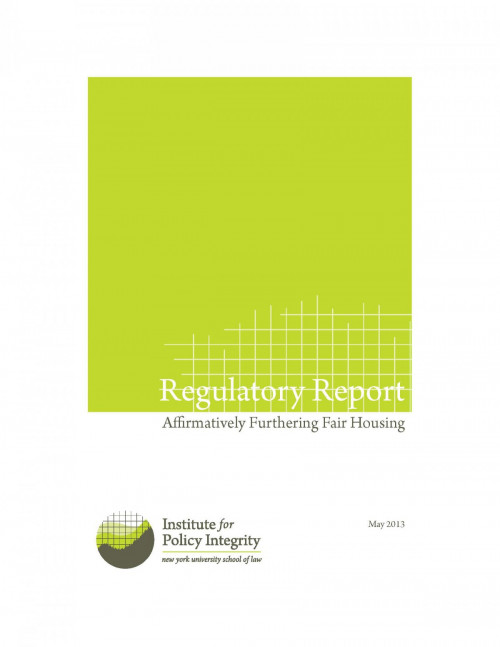-
ACUS Accepts Policy Integrity’s Recommendation on Remand Without Vacatur
The Administrative Conference of the United States (ACUS) Committee on Judicial Review accepted a recommendation made by Policy Integrity on remand without vacatur.
-
Comments on ACUS Draft Statement Regarding the OIRA Regulatory Review Process
Policy Integrity submitted comments on the draft statement by the Administrative Conference of the United States (ACUS) Committees on Administration and Management, and Regulation, for improving the timeliness, transparency, and effectiveness of the regulatory review process of the Office of Information and Regulatory Affairs (OIRA).
-
Comments on ACUS Draft Recommendations for Remand without Vacatur
Policy Integrity submitted comments on draft recommendations by the Administrative Conference of the United States (ACUS) Committee on Judicial Review for remand without vacatur in which a court returns a regulation to an agency for revision. This is an improvement to the traditional approach of annulling an agency action outright, which can result in creating an antiregulatory bias. But the draft recommendations could be strengthened in three ways:
-
Comments on Petition for Correction on Social Cost of Carbon
Policy Integrity, along with the Environmental Defense Fund, the Natural Resources Defense Council, and the Union of Concerned Scientists submitted comments opposing a petition for correction sent to the Office of Management and Budget (OMB) and the other agencies involved in the Interagency Working Group on the Social Cost of Carbon (IWG).
-
Proposal for ACUS Project on Petitions for Rulemaking
Policy Integrity submitted a proposal to the Administrative Conference of the United States (ACUS) for the development of recommendations on citizens’ petitions for rulemaking.
-
Comments to HUD on Improving Approaches to Affirmatively Furthering Fair Housing
HUD has implemented several recommendations outlined in a regulatory report published by the Institute for Policy Integrity in the proposed Affirmatively Furthering Fair Housing rule. By incorporating our recommendations, HUD has more clearly defined its goals in “affirmatively furthering fair housing,” and has provided metrics and data that municipalities can use to measure their compliance.
-
Comments on OIRA’s 2013 Annual Report
The Institute for Policy Integrity submitted comments in response to OIRA’s 2013 draft report to Congress. We suggest that OIRA can make further improvements to its final report by adding the following: recommend the balanced, transparent integration of employment impacts into cost-benefit analysis; recommend using retrospective review to pursue balanced, evidence-based, data-driven decisionmaking—not just cost-cutting; and recommend agencies coordinate by standardizing methodological practices, and should address claims of regulatory conflict or incoherence.
-
Policy Integrity sends Members of Congress a framework for addressing OIRA delays
In advance of nomination hearings for OIRA administrator appointee, Howard Shelanski, Policy Integrity sent a one-pager to members of Congress to give them a framework for addressing delays that sometimes occur in the regulatory review process.
-

Regulatory Report
Affirmatively Furthering Fair Housing
Decades after the civil rights movement inspired the Fair Housing Act, HUD still has a long way to go before that law’s vision of fair housing is realized. The primary recommendations of this report to the Department of Housing and Urban Development (HUD) are to more clearly define fair housing goals and to measure the progress of locally-based housing providers in meeting the requirements of the 1960’s civil rights statute.
-
Comments on ACUS Committee on Regulation Recommendations on CBA
Policy Integrity submitted comments on draft recommendations proposed by the ACUS (Administrative Conference of the United States) Committee on Regulation on the use of cost-benefit analysis at independent regulatory agencies.
Viewing recent projects in Government Transparency
